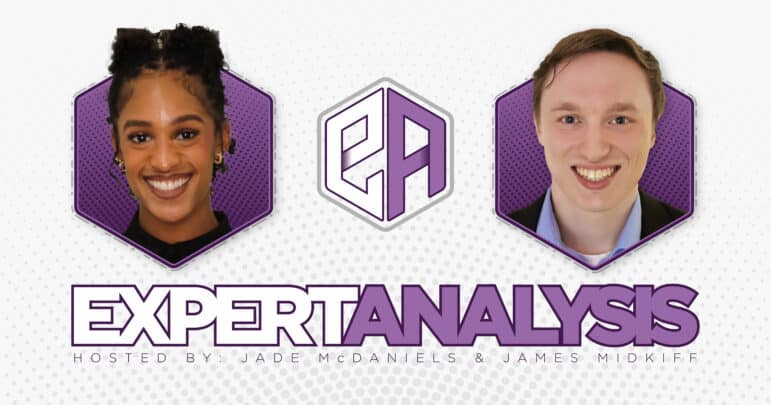The search for subject matter experts (SMEs) is an age-old problem when looking for assistance and mentorship or building a team around a subject matter. Expert Finders solve this problem by allowing users to search for colleagues with specific expertise. Instead of searching for content, Expert Finders focus on leveraging information found in content, tangential to the content, or from other organizational data sources to determine relevant people for a search query. Access to Experts is a key component of a Learning and Performance Ecosystem approach to workforce development, and Expert Finders are a technical tool that can enable this access.
In this blog, two of our technical consultants, Jade McDaniels and James Midkiff, answer common questions about Expert Finders, focusing on how to build and leverage them in an organization.
What defines an expert at my organization, and how do I generate that information?
Jade McDaniels
Experts are typically recognized as individuals who possess knowledge, skills, and experience regarding a subject area beyond that of a knowledgeable audience. Experts demonstrate a deep understanding of a specific field of study and are capable of wielding that knowledge to educate others, solve problems, and discover new opportunities for skill application. Within an organization, a few general markers to identify an Expert are:
- project participation records,
- contribution to content in their subject field knowledge base,
- certifications; and,
- the types of institutional groups they engage.
An important point is that these markers, which can be leveraged to identify an Expert, are not all indicators of what people have learned (i.e. certifications). Many of the indicators of expertise are performance-based (i.e. participation in projects that align with the topic).
Most, if not all, of the information that describes expertise and that will fuel the Expert Finder already exists within your organization and does not need to be created. For example, enterprise HR Systems hold person-specific details on employees, including their name, role, and records for past project participation and the capacity in which they served on the project. You can leverage wikis and document management systems like Confluence, Sharepoint, Smartsheet, etc., to aggregate metadata supporting expert-specific criteria. Expert Finders exist as the integration point between HR systems and enterprise knowledge repositories and demonstrate strong capabilities when aligning an expert with their sphere of influence and work produced – saving the cost of manual effort when building that data from scratch.
 James Midkiff
James Midkiff
For most organizations, the biggest hurdle to Expert Finders is identifying who is an expert in a given subject matter. Experts are rarely self-proclaimed and often need to be identified by their experiences. Someone may be considered an expert if they have;
- Demonstrated related learning such as:
- received a degree in a given topic,
- taken or led training courses, or
- earned certificates related to the subject matter.
- Demonstrated related performance such as:
- presented or authored a blog, book, or other publication on a subject,
- contributed to the organization’s knowledge base of communities of practice on the subject, or
- work or have worked on a relevant project at the organization.
There are many use cases when determining expertise, and we need to consider all of them when generating a list of experts. Initially, we can aggregate information by pulling metadata from the project or client management software, querying relevant data points from the enterprise data warehouse, or performing a project document analysis. Then, we leverage the aggregated information to generate confidence scores between individuals and subjects to measure how likely an individual is an expert in a subject. This approach may involve a custom data model (ontology) to enable our understanding of how an individual relates to topics and gives us precise methods to identify relationships. Confidence scores are how we can fine-tune our calculation of expertise and Expert Finder results.
Why do we need an Expert Finder?
Jade McDaniels
Expert Finders are essential to a unified view of an organization’s knowledge assets. The information existing in professionals’ heads, also known as tacit knowledge, is valuable and should be captured in a way that is easy to find and connect with for peers and leaders. Experts represent pillars of knowledge and confirm the strong points that exist within business units. The ability to recognize knowledge authorities and their areas of expertise optimizes opportunities for collaboration, creating innovative solutions, and knowledge retention.
Experts also maximize learning and performance outcomes in communities of practice, mentoring, and other peer-to-peer learning frameworks. While anyone at any level can contribute to a knowledge space, experts are the leaders as they’ve procured knowledge and experiences by applying knowledge. This voice of experience bolsters performance outcomes.
 James Midkiff
James Midkiff
Expert Finders are critical to helping people grow. Expertise is a source of knowledge, and connecting people over a shared or new area of interest enables individuals to learn from their peers in a natural way. It is even more important to intentionally support Social Learning with the exponential increase of hybrid work environments, enabling virtual colleagues, potentially new to the organization, to meet and socialize with peers with shared interests.
For team management, Expert Finders enable project managers to build teams with the right knowledge, skills, and abilities for success. Experts are easily located and given opportunities to share their wealth of knowledge and experience with their team members. Team members can identify peer mentors to help in their own individual growth.
Expert Finders are a natural extension to existing search tools that let individuals search for expertise, whether they’re looking for information or individuals. Depending on the system, we recommend integrating an Expert Finder with pre-existing search portals to help raise awareness of expertise at an organization.
Do I have to buy an expert finder software/system? What tools are available for Expert Finders?
Jade McDaniels
In the technology marketplace, there are a few existing out-of-the-box (OOTB) tools to leverage when searching for people within an organization. However, it’s important to note that the features advertised by available systems may only address some of the use cases and business needs of your institution. If you decide on a ready-made solution, you should align your decision around which system most meets your user requirements and any business goals that you wish to achieve.
Do you have to buy an Expert Finder system? The short answer is no. Off-the-shelf software offers many advantages, including rapid implementation and no/low maintenance support costs. Nonetheless, ready-made software is often limited in scalability and customization opportunities. Additionally, these systems are not guaranteed to integrate seamlessly with standing technological infrastructure. Instead, you can build your own Expert Finder to meet your business’s unique needs in terms of scalability, user requirement satisfaction, and integration with existing systems.
 James Midkiff
James Midkiff
Investing in an Expert Finder is important, whether OOTB or through custom development. There are a handful of available tools that provide the ability to search for people, including Glean and IBM Watson, or human resource platforms like Sift, Workday, and WorkForce Now. It is valuable to look into these options to see if any tools can provide all the features necessary to fit your use case. However, building your own Expert Finder will enable the most flexibility in how you model and curate expertise.
Designing an ontology will give you the best understanding of how to generate individual expertise. Once you develop the model, I recommend pulling in a sample of the data to instantiate the ontology and leverage a search engine to quickly retrieve experts. The data pipelines generating metadata about an individual and the relevance query used in the search engine are completely open for you to tune to fit your expertise needs. Free Lucene-based search engines (like Elasticsearch or Solr) are easy to get up and running. If you’re feeling adventurous, you can experiment with a vector search engine (like Milvus, Qdrant, or Weaviate) since they enable more semantic search capabilities and the ability to understand more about the input search query.
How do I get started building an Expert Finder?
Jade McDaniels
The first step in building an Expert Finder is determining whether or not your organization would benefit from implementing one. Before expending resources on a ready-made platform or investing in a custom code solution, confirm that an Expert Finder aligns with the problems you want to alleviate, behaviors you want to enable, and business values you wish to promote.
From there, approach building your Expert Finder from 4 different perspectives.
- Source System(s): Consider if and where the data that determines expertise lives within your organization. Recognizing source data repositories will aid in the process of determining the technology you need to integrate with said systems.
- Data Processing: This point focuses on how the system will process information to infer the relationship between individuals and an area of expertise and determine who is an expert. Establishing these relationships requires the implementation of data modeling and, thus, a tool that can facilitate those connections and processes.
- Search: The purpose of an Expert Finder is to support finding information and individuals. It’s essential to understand how a user will search for said information and individuals and confirm that the utilized search application complements their search patterns.
- Design: Effectively connecting searchers to information or people requires the thoughtful delivery of those details. Consider how knowledge should be shaped and delivered as a search result for optimal engagement and action by end users.
 James Midkiff
James Midkiff
I tend to like lists, so here are my 5 steps to build an Expert Finder.
- Brainstorm Expert Finder Use Cases: Ideate who could benefit from expert information and how they might interact with an Expert Finder. What business value does an Expert Finder have for your use case?
- Identify Expertise Data: Determine the data (generated or made available for processing) to leverage for determining expertise in a subject area.
- Design the Interactions: Once you have brainstormed the use cases and identified supporting information, try designing what that use case could look like if it were implemented.
- Architect the Integrations: Now that we know the goal, take a step back and determine the location of supporting information and how to pull that data into one location for the Expert Finder.
- Implement the Use Case: After documenting the use cases (and business values), the designs are in place, and the architecture is ready to go, start putting the pieces together.
Make sure to start small, prioritizing architecture implementation to enhance search relevance. Iteratively update the data pipelines and search queries to ensure expertise searches match expectations.
Conclusion
Expert Finders are search interfaces that leverage enterprise learning and performance data to make expertise findable across your organization. Expert Finders enable individuals to find mentors, communities of practice to find SME leads, and business leaders to identify emerging organizational leaders. The decision to build an Expert Finder from scratch or utilize an OOTB solution is largely based on your business’s needs. If you are looking for help determining which solution is best for your organization, please contact us.



